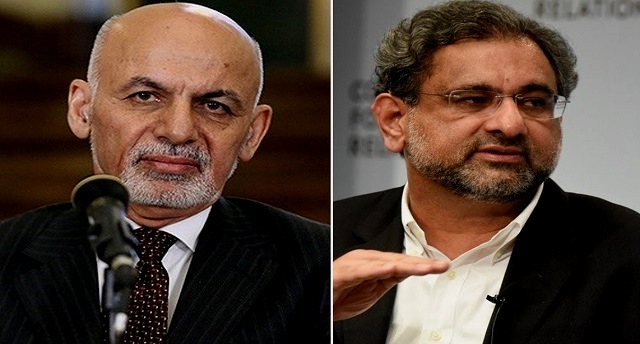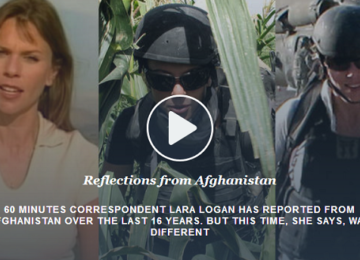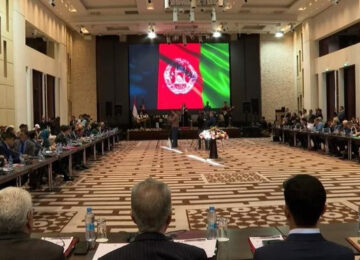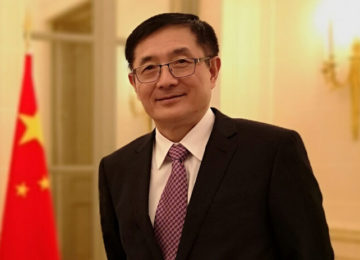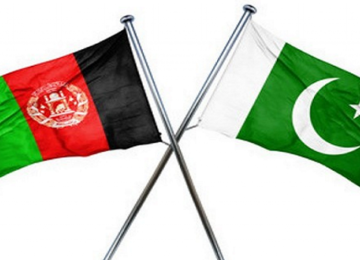Pakistan and Afghanistan will exchange highest-level visits soon to hammer out a deal to improve bilateral ties, The Nation learnt.
Senior officials at the foreign ministry said that Prime Minister Shahid Khaqan Abbasi had accepted an invitation by Afghan President Ashraf Ghani to visit Kabul.
An official said: “The dates will be finalised through diplomatic channels. We also expect President Ashraf Ghani to return the visit later.”
He added: “The highest-level talks are aimed at discussing the misunderstandings and trying to find ways for improving the ties.”
Earlier, President Ashraf Ghani has extended an official invitation to Prime Minister Shahid Khaqan Abbasi to visit Afghanistan.
In a tweet, he said the invitation would initiate state-to-state comprehensive dialogue between the two countries.
All through the recent tension between Pakistan and Afghanistan, the United States has been pressing both the sides to resolve the issues on the table instead of engaging in a conflict.
But the US itself preferred to use force against the militants, ignoring Pakistan’s calls for peace talks.
Pakistan says it is against confrontation but expected Afghanistan to act against the terrorists’ sanctuaries. After Pakistan’s serious reaction to the wave of terror last year, the two sides settled for a tentative peace agreement when Kabul promised to act against terrorists’ sanctuaries inside Afghanistan.
However, they also handed a list of 32 alleged training centres inside Pakistan.
There were reports Afghanistan was also preparing to carry out “surgical strikes” inside Pakistan in response to Pakistan’s action along the border.
But keeping in mind Pakistan’s military strength, Kabul never opted for this step.
Pakistan forces had already moved heavy artillery and military equipment closer to Pak-Afghan border to stop infiltration and destroy the militants’ hideouts along the frontier amid the Afghan threats.
This week, however, Pakistan and Afghanistan reiterated their commitment to peace and stability of each other and agreed to work in a cooperative framework for a brighter future.
The understanding was reached at the meetings of National Security Adviser Nasser Khan Janjua with Afghan leadership during his visit to Kabul, said an official statement.
The NSA had “elaborate and successful meetings” with President Ashraf Ghani, Chief Executive Abdullah Abdullah, his counterpart Haneef Atmar and others.
“By addressing each other’s concerns, both sides expressed their resolve to work together and enhance cooperation to improve bilateral relations,” said the statement.
Janjua termed President Ghani’s invitation to Prime Minister Abbasi a “good omen”, which would help in bringing both the countries more closer in the war against terrorism.
President Ghani pinned strong hopes with Pakistan, and said. “We have made a sincere and serious offer of peace, and together we have to make the best of it by rising beyond past. Let’s not remain prisoners of [the] past and let’s secure our future with the aim not to win the war but to end it for which Pakistan should help,” the Afghan president said.
He also expressed strong support for regional connectivity with Central Asian Republics (CARS) to reap the benefits of ideal geo-strategic locations of Afghanistan and Pakistan.
“Without each other, we are not complete,” President Ghani added.
He desired for a roadmap to be prepared for a comprehensive engagement with Pakistan to carry the relationship further with a leap of faith.
Availing the opportunity, President Ghani also handed over the letter of invitation to the NSA for the prime minister of Pakistan and expected him to visit as soon as possible. The NSA thanked the president for extending an invitation to the prime minister of Pakistan and also acknowledged the warmth displayed for him and Pakistan, and appreciated the peace offer made by the president.
He termed the peace offer as a light on the other side of the tunnel in a war which had become rather perpetual. Seeking the closure of conflict instead of winning it is a righteous approach.
Janjua expressed deep sympathies with the people of Afghanistan who had seen nothing but war since last 40 years.
He also expressed complete support for the peace offer, which was long awaited.
“Use of force only injures people, wars are however virtually won politically,” he added.
Assuring of Pakistan’s full support for the vision of peace, Janjua, however, highlighted that isolated, blamed and coerced Pakistan was of lesser use to Afghanistan. The world has started to look at and undermine Pakistan through the prism of Afghanistan, which is not correct.
We need to commit to each other and invest in bilateral relationship and Afghanistan needs to stand with Pakistan and both need to win peace together, Janjua. “Our peace is mutual, lets seek it together,” the NSA added.
The same sentiments were acknowledged and reciprocated by the Afghan government.
They also agreed to seize this moment collectively and to improve bilateral relations in pursuit of the common objectives.
In meeting with Janjua, Haneef Atmar said, “It’s time to build bridges. We have a shared history and shared future. That is what our ancestors left for us and we have to leave for our children. We should work for our shared interests in all fields including political, economic and security. We must protect our relationship and advance it further.”
Foreign Office spokesperson Dr Mohammed Faisal said no military solution existed for Afghanistan, and Pakistan was ready to play role in the reconciliation process.
The spokesperson said the US and coalition forces in Afghanistan needed to do more to nab militants using Afghan soil for perpetrating heinous activities inside Pakistan.
Faisal said Pakistan supported the dialogue process with Afghanistan to resolve the bilateral issues.
Another official said Pakistan was not engaging in talks with Afghanistan under any pressure.
“This is our own initiative. We want to have a peaceful neighbourhood,” he added.
Defence analyst and former Lt General Talat Masood said Pakistan had always worked for peace with Afghanistan. “Good relations with Afghanistan are in our own interest,” he said.
Masood said the Afghan Taliban must be brought to the negotiation table to end the instability in Afghanistan. “All the stakeholders should have to work to sort out prevailing Afghan situation,” he said.
Masood said for the last 16 years, the US had tried everything and spent almost $800 billion to suppress the Taliban insurgency, but to no avail. “This means we will have to engage in talks sooner or later. There is no military solution to the Afghan issue,” he maintained.
This piece originally appeared on The Nation on March 19, 2018. Original link.
Disclaimer: Views expressed on this blog are not necessarily endorsed or supported by the Center for Research and Security Studies, Islamabad.



